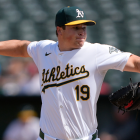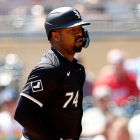Spring training is fast approach and that means we're creeping up on extension season. Historically, teams get down to business locking up their best players in February and March. There were 33 contract extensions signed during the 2019 calendar year and 20 of the 33 were signed in February and March. Extension season is coming soon.
With that in mind, let's look at the top extension candidates heading into the 2020 season. We're going to focus on arbitration-eligible players only because they're the most likely candidates to sign extensions. That means pre-arbitration wunderkinds like Juan Soto and Shane Bieber will not be covered here. They are very much extension candidates though.
Also, we're only going to look at realistic extension candidates, so we have to apply some subjectivity. Yeah, Mookie Betts could sign an extension (with whatever team he ends up with in 2020), but he seems pretty intent on testing free agency next winter, so we'll ignore him. Are the Indians really going to give Francisco Lindor a $300 million extension? Probably not. Maybe they'll trade him to a team that will.
Already this month we've seen arbitration-eligible players David Peralta (three years, $22 million), Miguel Sano (three years, $30 million), and Trevor Story (two years, $27.5 million) sign multi-year extensions. Here are 10 other notable extension candidates heading into 2020, listed alphabetically.
Last month, GM Jed Hoyer conceded the Cubs are "past the point" of being able to sign all their homegrown players to extensions. "I think there are certain realities where we are not going to be able to keep this group together forever. It may be by them leaving through free agency. It may be by us trading some of them. We might be able to extend some of them," he said.
Javier Baez, the 2018 MVP runner-up, is the most obvious extension candidate from a group that includes trade candidates Kris Bryant and Willson Contreras, soon-to-be 31-year-old Anthony Rizzo, and the defensively challenged Kyle Schwarber. Baez turned only 27 in December and he is a dynamic up-the-middle player who impacts the game in all phases. He's a superstar.
Earlier this month the Cubs and Baez agreed to a one-year contract worth $10 million, covering 2020. They'll go through arbitration again next offseason before Baez becomes eligible for free agency following the 2021 season. The two sides could rip that 2020 contract up and replace it with a new deal, or tack an extension that begins in 2021 on to the one-year deal. Lots of options.
Contract benchmark: There is no good contract reference point at Baez's service-time level. Jean Segura signed a five-year deal worth $70 million in 2017, but Baez is better and more accomplished. A long-term deal for Baez likely includes a $15 million or so salary in 2021 and then $20-plus million for each free agent year bought out after that.
Hoo boy is Cody Bellinger about to get expensive. The Dodgers slugger took a Rookie of the Year and an MVP into arbitration this offseason and walked away with an $11.5 million salary, a record for a player in his first year of arbitration eligibility. Bellinger's service time makes him a Super Two, so he will go through arbitration four times rather than the usual three.
Consider the salary possibilities:
- 2020: $11.5 million (locked in for first arbitration year)
- 2021: $18 million? (second arbitration year)
- 2022: $27 million? (third arbitration year)
- 2023: $35 million? (final arbitration year before free agency)
That's the "oh yeah he really is that good" scenario, and you can understand why the Dodgers may want to lock him up now. They have deep pockets -- very deep pockets -- but the sooner they sign Bellinger, the bigger the discount, and the more money left to spend on other players. Seems like a win-win, no? Bellinger gets paid and the Dodgers get cost certainty.
There's one small problem though: Bellinger is a Scott Boras client, and Boras tends to take his best players through arbitration, setting them up for a massive free agent payday. Bellinger will hit free agency at age 28. He's also locked in a big 2020 salary, so he may have less financial incentive to sign long-term now. The Dodgers should at least approach Boras about a deal. Doesn't hurt to ask.
Contract benchmark: Believe it or not, we have a good contract benchmark for Bellinger. Seven years ago the Giants gave Buster Posey an eight-year contract worth $159 million at Bellinger's service-time level. Posey was a Super Two and he also took Rookie of the Year and MVP awards into arbitration. There is seven years worth of inflation to consider, but that's the starting point.
The Twins have aggressively locked up their top young players since president of baseball operations Derek Falvey took over in October of 2016. They gave Max Kepler and Jorge Polanco five-year extensions last spring, and a few weeks ago they signed Sano to his three-year contract. Staff ace Jose Berrios is a logical extension candidate.
In fact, Berrios rejected an extension offer last spring, according to Phil Miller of the Minneapolis Star Tribune. "Every player wants to sign a multi-year deal, but we know it's a business. I have to manage my business, too ... We're waiting for the best for both sides. If it doesn't happen this year, maybe next year," Berrios said at the time. He sounds open to a deal, if nothing else.
Berrios and the Twins could not agree to terms prior to the arbitration salary filing deadline earlier this month. Berrios filed for $4.4 million and the team countered with $4.025 million. Rather than go to a contentious arbitration hearing, the two sides could work out a multi-year deal. Berrios gets financial security and the Twins get long-term cost control of their No. 1 starter.
Contract benchmark: The four-year, $45 million extension the Phillies gave Aaron Nola at this service time last year might be a bit too rich for Berrios -- Nola was coming off a much better platform year and finished third in the Cy Young voting -- but it's in the ballpark. That deal bought out Nola's three arbitration years and one free agent year, with an option for a second free agent year.
Under John Hart in the 1990s, the Indians started the trend of signing core players to long-term contracts earlier in their careers. Cleveland continues to be aggressive locking up their top players and it stands to reason the team will approach Mike Clevinger now that he's in his money makin' arbitration years. Bieber and Clevinger are the rotation foundation moving forward.
For what it's worth, there are no indications the Indians have engaged Clevinger (or Bieber) in long-term contract extension talks, but that could change with one phone call. Here's what GM Mike Chernoff told reporters, including MLB.com's Mandy Bell, about signing Clevinger (or Bieber) to an extension recently:
"I've seen us do it in the past with both young pitchers and position players in their pre-arbitration years or as they get to arbitration," Chernoff said. "We just have to determine if it's a good fit for us and for those guys. But obviously they're with us for a long time and we hope like with most of our players to continue to extend them moving forward."
Clevinger agreed to a one-year deal worth $4.1 million earlier this month and he is three years away from free agency. He's a bit of a late bloomer -- he turned 29 in December -- who has had some injury problems, so he might jump at an extension now. Clevinger would lock in financial security and not have to worry about navigating the free-agent market at age 32 in three years.
Contract benchmark: Nola's extension applies here as well, but, similar to Berrios, it's probably a little too rich for Clevinger. The last starting pitcher to sign a long-term deal at this service-time level prior to Nola was Carlos Martinez. The Cardinals gave him a five-year deal worth $55 million in 2017. I think something a tick below Nola makes sense for both sides.
A wrist injury cut short what could've a third consecutive 40-homer season for Rangers slugger Joey Gallo. He hit 22 homers in 70 games and took 110 career homers into arbitration this offseason, which is a ton at his service-time level. Gallo and the Rangers agreed to a $4.4 million salary earlier this month, with the injury and lack of hardware (no awards, one All-Star Game) costing him.
Rangers GM Jon Daniels told reporters, including MLB.com's T.R. Sullivan, the club is open to long-term extensions with their core players last spring -- "It is something we have discussed internally. I think the idea of keeping some of our young group together for a long period of time is appealing," he said -- and soon thereafter they extended Jose Leclerc. This is on their mind.
The Rangers are moving into a new ballpark this season and their active offseason did not involve adding a big bat to improve an offense that ranked 25th with an 88 OPS+ last year. Locking up Gallo would, if nothing else, create some buzz going into spring training and also make it clear the club is building around his bat going forward.
Contract benchmark: The Reds gave Eugenio Suarez seven years and $66 million at Gallo's service-time level two years ago. That strikes me as a little light for Gallo, however, because he's an established elite power hitter, and home runs pay very well in arbitration. (Suarez had his power breakout in 2019.) Kyle Seager's seven-year, $100 million deal may be more appropriate.
Injuries likely cost Yankees slugger Aaron Judge a chance at a $10 million payday in 2020. Instead, he received an $8 million salary in his first trip through arbitration. He went into arbitration with a Rookie of the Year and an MVP runner-up, as well as 110 career homers, which will forever pay well in arbitration. Judge, who turns 28 in April, is poised to make major money during his three arbitration years.
Last spring Judge told reporters, including the New York Post's George King, the Yankees had not approached him about a long-term extension, but GM Brian Cashman said the team is open to it. Here's what Cashman told King:
"On individual cases we have approached certain players. We are always open with the right people to do things if at all possible," Cashman said. "We have had conversations with some, not all. If they lead to multi-years [deal], great. [Luis Severino's] did. So far, some have failed. It takes two to tango."
The Yankees operate in the luxury tax world and signing Judge to an extension would change that calculus. If they gave him a deal worth, say, $20 million per year, his 2020 luxury tax number would increase from $8 million to $20 million. They'd trade the big hit up front for a lower luxury tax number down the road, in theory. Just something to consider. Judge will be a free agent in three years.
Contract benchmark: Lots of players signed extensions at Judge's service-time level but few have accomplished as much as him, so there aren't many relevant contract benchmarks. The Braves gave Freddie Freeman an eight-year deal worth $135 million back in 2014. Does that work? Freeman was four years younger than Judge is now, and there's a lot of inflation to consider.
Of all the players in this post, Phillies catcher J.T. Realmuto is the one I most expect to sign an extension this spring. He will be a free agent after this season and is the best all-around catcher in the game. He'll turn only 29 in March too. This is a prime-aged star at the most premium position on the field. It's a player you pay to keep, no questions asked.
The Phillies are trying to get back to the postseason after a series of disappointing finishes and presumably they are very motivated to keep Realmuto. That is good news for Realmuto and his representatives at the BBI Sports Group. The club is desperate to some degree, and desperation often equals overpayment. The two sides are talking about an extension, for what it's worth.
Realmuto and the Phillies did not agree to a 2020 contract prior to the arbitration salary filing deadline earlier this month. He filed for $12.4 million and the team countered with $10 million. That's a pretty significant gap, though Realmuto says there are no hard feelings. Here's what he told MLB.com's Todd Zolecki about arbitration potentially affecting extension talks:
"No, not at all," he said before the Philadelphia Sports Writers' Association banquet at the Crowne Plaza. "I mean, anybody who knows much about the arbitration process knows that it's business. It's not necessarily me against the Phillies right now. There's definitely not any hard feelings there. So I feel like we're in the same place we were two or three months ago with the contract extension."
Contract benchmark: Historically, players who sign extensions one year before free agency get paid like free agents. There's no discount like there is with players who sign long-term deals multiple years prior to free agency. The contracts most relevant to Realmuto now are the big free-agent contracts signed by catchers in recent years, such as:
- Brian McCann, Yankees: 5 years and $85 million at age 30
- Russell Martin, Blue Jays: 5 years and $82 million at age 32
- Yasmani Grandal, White Sox: 4 years and $73 million at age 31
Realmuto will be 30 on Opening Day 2021, so he is the same as McCann when McCann hit free agency. McCann signed his deal seven years ago now, so that's a lot of inflation to consider. I think Realmuto is in line for at least five years and $100 million, which would make him only the third catcher in history with a contract that averages $20 million annually (Joe Mauer and Yadier Molina).
The Athletics are not a big-market team and their ballpark situation is, uh, unfortunate, but their best players want to stick around. Matt Chapman recently told the San Francisco Chronicle's Susan Slusser he's open to an extension -- Chapman is still in his pre-arbitration years -- and reigning MVP third-place finisher Marcus Semien is open to a long-term extension as well.
Semien will become a free agent after 2020 and last month Billy Beane, the A's vice president of baseball operations, told NBC Sports Bay Area's Brodie Brazil the team was focused on signing Semien to a one-year deal to avoid arbitration. The two sides have since agreed to a $13 million salary for 2020. From Brazil:
"I think the first order of a business standpoint is getting through this arbitration season [in 2020]," Beane told NBC Sports California on Tuesday, indicating that a bigger picture agreement is not immediately right around the corner.
"Guys who have years like Marcus usually get significant raises, and that's the anticipation we're expecting for him through the arbitration process. Anything beyond that, we'd be better served at discussing after that one year is in place."
Semien has turned himself into a Gold Glove defender at shortstop and he had a career year at the plate in 2019. He plays a premium position and he plays it well, and he turned only 29 in September, so he's right smack in the prime of his career. That's a player the A's should want to keep long-term and I'm sure they do. Can they afford to keep him? That's the real question.
Oakland notoriously runs small payrolls, and, to make matters worse, the A's have been phased out of the league's revenue sharing program. They will receive zero revenue sharing dollars in 2020. The club had been receiving revenue sharing due to their ballpark situation, but they play in a large market, and eventually MLB had to cut them off. The revenue sharing well is now dried up.
Cot's Baseball Contracts estimates the A's payroll at $92.5 million this coming season, almost identical to last year. Keeping Semien and paying big arbitration raises to Chapman (and Matt Olson) in 2021 and beyond might not be doable. For now, Semien is open to a long-term deal, and now that they've agreed to a 2020 contract, the A's should find out what it'll take to keep him.
Contract benchmark: As noted in the Realmuto blurb, players who sign extensions one year prior to free agency get paid like free agents, so Semien's looking at a nice payday. The Red Sox gave Xander Bogaerts a six-year deal worth $120 million last year, in his final arbitration season, but Bogaerts is younger than Semien and has a longer track record as a top player.
The more appropriate contract might be the four-year, $64 million deal the Reds gave Mike Moustakas to play second base earlier this offseason. Add that to the one-year deal Semien signed for 2020 and the total package is five years and $77 million. Add in a signing bonus and/or the buyout of an option year and the deal could be pushed to $80 million. That's a good ballpark number.
There was speculation the Astros would look to quickly sign George Springer, an impending free agent, to a long-term extension to generate some positive headlines after the whole sign-stealing scandal, but that hasn't happened just yet. Instead, the two sides avoided an arbitration hearing with a one-year, $21 million deal. Springer is still on track to be a free agent next offseason.
It's worth noting the Astros have tried to sign Springer long-term in the past. They offered him a seven-year deal worth $23 million before he even made his MLB debut. He rejected that and will instead make $48.9 million in his four arbitration years as a Super Two, so yeah, that worked out very nicely for him. Springer bet on himself and has reaped the financial rewards.
The single biggest obstacle to a Springer extension is not Springer's contract demands. It's the Astros not having a fully functioning front office. Former GM Jeff Luhnow, who offered Springer that $23 million deal year ago, was fired in the wake of the sign-stealing scandal. Owner Jim Crane is currently overseeing baseball operations and Luhnow has not yet been replaced.
Can a team extend a player without a fully operational front office? Sure. It's Crane's team and he can run it however he sees fit. Would it make more sense for the Astros to wait until they have a new general manager in place, and let him figure out how to proceed? Yeah, I think so. The front office turmoil throws a big wrench into any Springer extension plans.
Contract benchmark: I try to keep the contract benchmarks position specific because some positions pay better than others, but, in this case, I think the best contract reference point for Springer is a first baseman: Paul Goldschmidt. Goldschmidt signed a five-year extension worth $130 million last spring that begins this year. Including 2019, the total package is six years and $144.5 million.
Springer is a year younger now than Goldschmidt was when he signed his extension, but they're both perennial All-Stars who do great work in the community. Adding five years and $130 million to Springer's 2020 contract seems like an easy call for Houston, at least to me. I guess that means it's not fair to Springer. Maybe Anthony Rendon money (seven years and $245 million) is doable?
At this time last year I thought there was no chance the Nationals would let Rendon leave after losing Bryce Harper. Sure enough, they let Rendon leave. Would they really let Trea Turner leave too? Turner is still three years away from free agency, so this isn't an urgent matter, but dynamic shortstops are worth keeping around. Turner, Soto, and Victor Robles are the young core now.
Turner is a Super Two and he agreed to a $7.45 million salary for 2020. The 26-year-old played it cool with reporters recently, saying he's open to an extension with the defending World Series champions, but he's not going to sell himself short either. From NBC Sports Washington's Todd Dybas:
"For me, I'm gray on a lot of areas," Turner told NBC Sports Washington. "If the deal's right, if I like it, I'm not scared to take it. Same thing, if it's not right, I'm not going to settle. Everyone I think knows their worth, [they] at least think they're worth something -- whatever that is, high, low, willing to take less or try to get more.
"For me, I'm all ears. I'll listen and communicate. At the end of the day, I like it here. I don't think the grass is always greener on the other side, per se, and I'm happy where I'm at. If it comes to that, I'll be happy to play here hopefully my entire career if they'll let me. But, I'm also weighing all options. I think everybody should. If you don't listen, I think it's a little foolish."
Contract benchmark: The last Super Two infielder to sign a long-term extension at Turner's service time level was Dee Gordon in 2016. The Marlins gave him five years and $50 million. Can't see that working for Turner. The Padres gave Wil Myers six years and $83 million at a similar service time a few years ago, but he wasn't a Super Two. I can't imagine Turner's camp will take less. The Myers deal is where negotiations start.
Other extension candidates: LHP Matthew Boyd, Tigers; OF Michael Conforto, Mets; RHP Mike Foltynewicz, Braves; 1B/OF Trey Mancini, Orioles; RHP Joe Musgrove, Pirates; OF Tommy Pham, Padres; LHP Eduardo Rodriguez, Red Sox; DH Jorge Soler, Royals; SS Dansby Swanson, Braves; RHP Kirby Yates, Padres








































